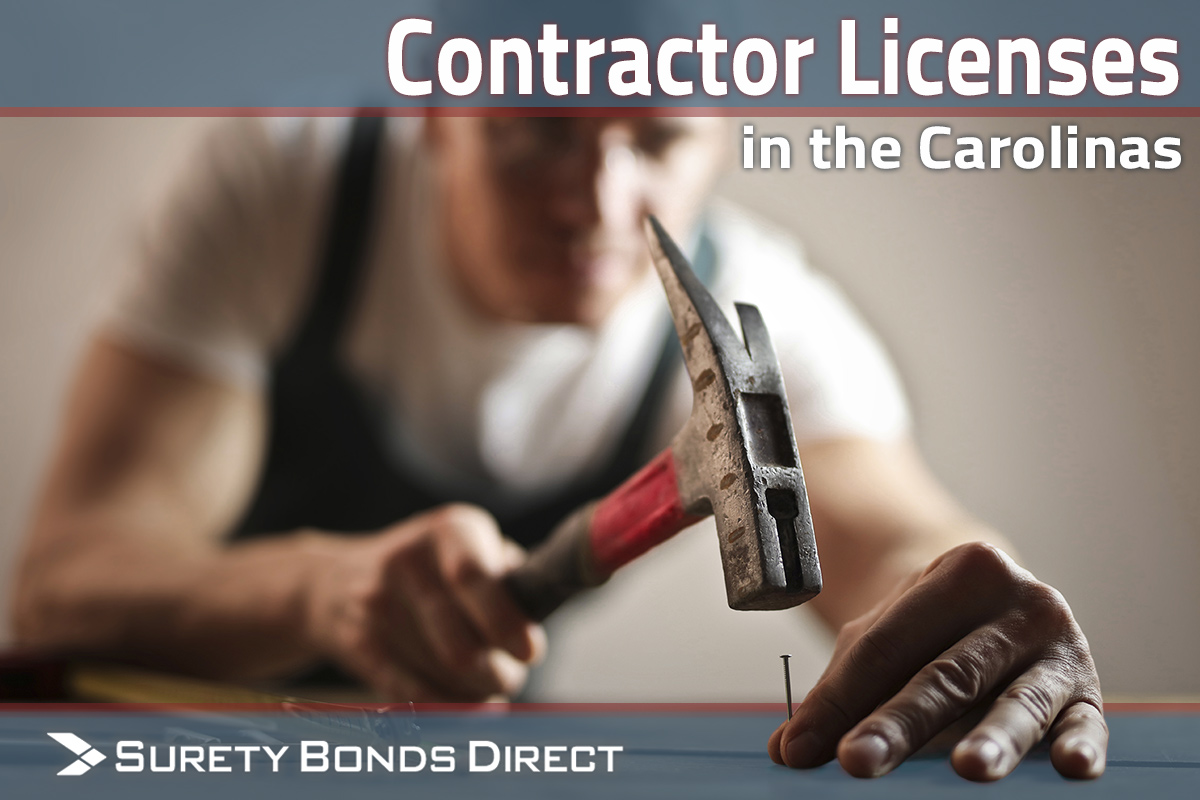North Carolina and South Carolina are two states that have it all: beautiful scenery, historic attractions, and relatively mild climates. Another thing that both of these states have in common: a thriving construction sector.
Anyone considering entering the construction business in North Carolina or South Carolina should know that they’ll likely need a contractor’s license. To get a North Carolina contractor’s license or South Carolina contractor’s license, you’ll need to understand the various requirements that the states impose as part of the licensing process. These include licensing tests, contractor surety bonds, and more. This article will give you a quick introduction to North Carolina contractor’s licenses and South Carolina contractor’s licenses, the application requirements, and the surety bonds that are required. First, we’ll examine why contractor’s licenses are so important.
Why You Need a Contractor’s License in North Carolina or South Carolina
Most states require a construction contractor to be licensed by a state board before the contractor can accept residential or commercial construction contracts. Contractor licensing systems keep contractors accountable for their conduct on the job and help prevent fraudulent contractors from taking advantage of home and business owners. Here are some of the reasons that it’s important to get your general contractor’s license if you plan to become a contractor in North or South Carolina:
- Most home and business owners will do business only with a licensed contractor.
- Only licensed contractors can bid on state construction contracts, which are often lucrative.
- Unlicensed contractors may face civil penalties (including large fines and orders to stop operating their business) if they accept contracts that require licensure.
- Courts might not enforce payment claims filed by an unlicensed contractor on contracts that require licensure.
With these factors in mind, let’s look at some specific requirements for North Carolina and South Carolina contractor licenses.

North Carolina Contractor’s License
Any contractor who wants to accept contracts worth $30,000 or more in North Carolina must be licensed by the NC General Contractor’s Licensing Board. Contractors who exclusively accept contracts valued under $30,000 don’t need a GC license, but getting your license is still a good idea for all of the reasons outlined above.
The NC contractor’s license system has three levels that determine the value of contracts which licensees can accept. Each license level requires a certain amount of working capital or contractor surety bond coverage:
| Requirement | Limited License | Intermediate License | Unlimited License |
|---|---|---|---|
| Application/Renewal Fee | $75 | $100 | $125 |
| Maximum Individual Contract Value | $500,000 | $1,000,000 | Unlimited |
| Financial Requirements | $17,000 working capital OR $80,000 net worth OR $350,000 contractor surety bond | $75,000 working capital with audited financial statement OR $1,000,000 contractor surety bond | $150,000 working capital with audited financial statement OR $2,000,000 contractor surety bond |
Other requirements for a North Carolina contractor’s license include:
- Applying for an NC business license through the NC Secretary of State
- Registering for an NC tax ID number through the NC Department of Revenue
- Passing an NC contractor’s exam specific to your field
- Fulfilling any additional requirements imposed by your local government

South Carolina Contractor’s License
South Carolina issues three different types of contractor licenses. Contractors may need only one license type, or they may need a combination of multiple types:
| Requirement | General and Mechanical Contractor | Residential Home Builder | Residential Specialty Contractor |
|---|---|---|---|
| Licensing Fee | $350, plus $135 renewal fee biennially | $80 or $160 (depending on year issued) plus $100 application fee | $80 or $160 (depending on year issued) plus $100 application fee |
| Required for | Any commercial, residential, or industrial building contract over $5,000 | Contractors who wish to accept residential home building contracts without mechanical, electrical, or plumbing work | Specialty contractors in fields such as HVAC, drywall, electrical work, and roofing |
| Contractor Surety Bond | Tiered requirements depending on the value of the contracts accepted; can be as low as $7,000 or as high as $500,000 | $15,000 | $10,000 for HVAC/electrical/plumbing; $5,000 for all other specialty trades |
Like North Carolina, South Carolina doesn’t require a contractor’s license for certain types of small projects. Your South Carolina contractor licensing process may also require any or all of the following:
- Applying for either a local or state business license
- Passing a test in state business law as well as a state contractor’s test
- Providing notarized financial statements
- Providing signed documentation certifying your experience in your field
- Fulfilling any additional requirements imposed by your local government
Surety Bonds Direct can help you get a North Carolina contractor’s license bond or South Carolina contractor’s license bond quickly and at an affordable surety bond cost. Get a free quote for your contractor’s license bond in just a few minutes today, or speak with our bond experts by calling 1-800-608-9950.


